Biden pivots to Asia as he hosts South Korea's president
It was just his second in-person meeting with a foreign leader.
Despite fighting in the Middle East dominating headlines this week, President Joe Biden on Friday kept his focus on Asia while hosting South Korea's president at the White House for his second in-person meeting with a foreign leader since he took office.
Speaking ahead of a bilateral meeting, Biden thanked President Moon Jae-in for making the trip to Washington. He explained to reporters they were running behind schedule -- which includes a joint press conference Friday evening -- because a private meeting between the two leaders ran long.
"Staff kept coming out and saying, 'You're over time. You're over time,' but I enjoyed the meeting so much that we caused us to move everything back," Biden said. "I look forward to continuing our discussion today, here, and in growing the US-ROK relationship further as we take on new challenges, and we take them on together."
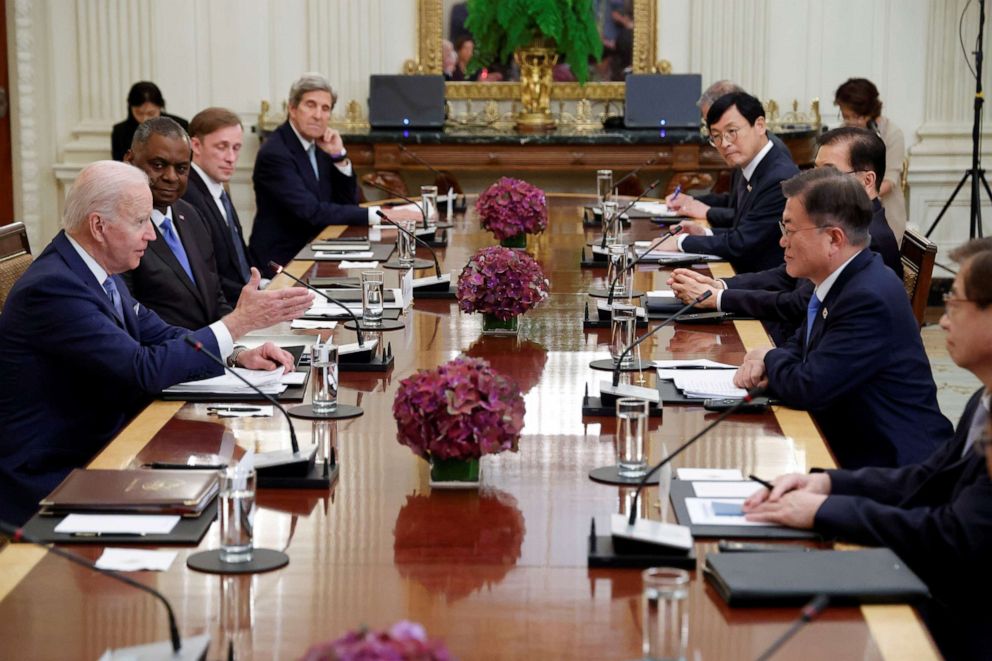
Moon, speaking through a translator, returned the thanks to Biden for his "warm" hospitality and said he hopes to welcome Biden in South Korea in the "not so distant future."
"The world is welcoming America's return and keeping their hopes high for America's leaders more than ever before," he said. "Although tricky challenges lie ahead of us as allies this year... our two countries will actively work together to address global challenges, such as COVID-19, economic recovery and climate change, and we will usher in a new era."
The leaders were joined in the White House Dining Room by Secretary of State Antony Blinken, Defense Secretary Lloyd Austin, Treasury Secretary Janet Yellen, Special Presidential Envoy John Kerry, National Security Adviser Jake Sullivan and Commerce Secretary Gina Raimondo, along with a delegation from South Korea.
On the campaign trail and since taking office, Biden has made clear that U.S. competition with China has shaped his view of the world, and the fact that his second meeting was with Moon reflected the emphasis Biden's administration was putting on Asia. The only other leader Biden has hosted at the White House was from Asia, too: Japanese Prime Minister Yoshihide Suga.
Earlier Friday, it was Vice President Kamala Harris to first welcome Moon in the vice president's ceremonial office. Neither Harris nor Moon wore masks, a first for a meeting with a foreign leader in the Biden administration, and they also shook hands.
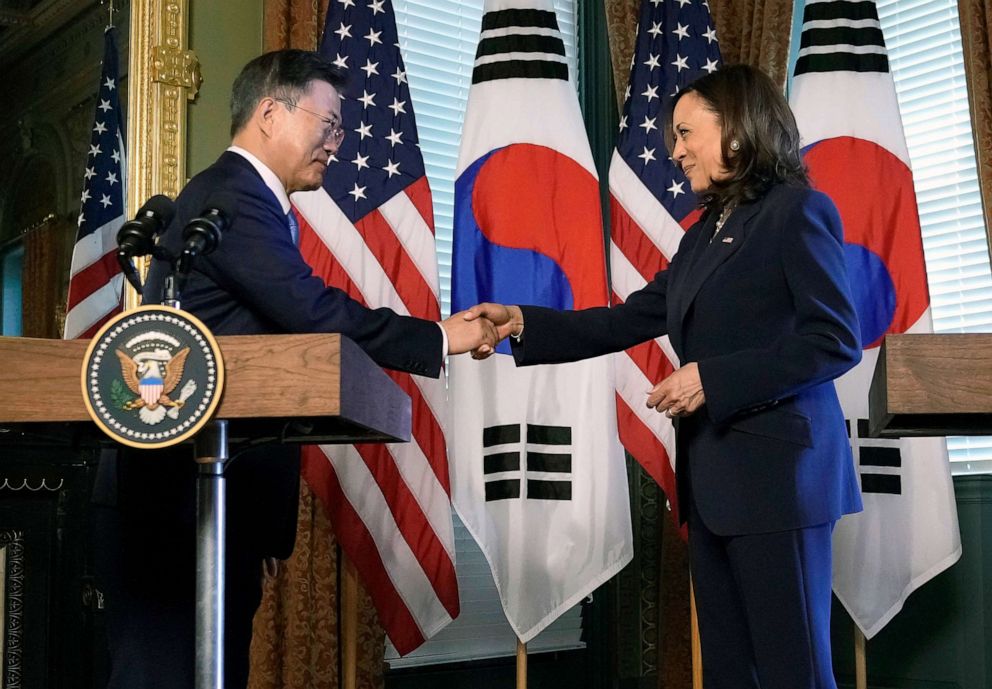
Harris said that the administration is "confident" it can "promote a free, open, and prosperous Indo-Pacific region" that is "unconstrained by coercion."
Through a translator, Moon congratulated Harris on her historic achievement as the first woman and woman of color to be vice president. She is also the first person of South Asian descent to hold the office.
"I remember around the time you were inaugurated, many women across the United States participated in the wear of pearls on Jan. 20 social media campaign, which was very impressive. I believe it was a way to show affection and support to you -- who have fought against invisible discrimination at the forefront and broke the glass ceiling," he said.
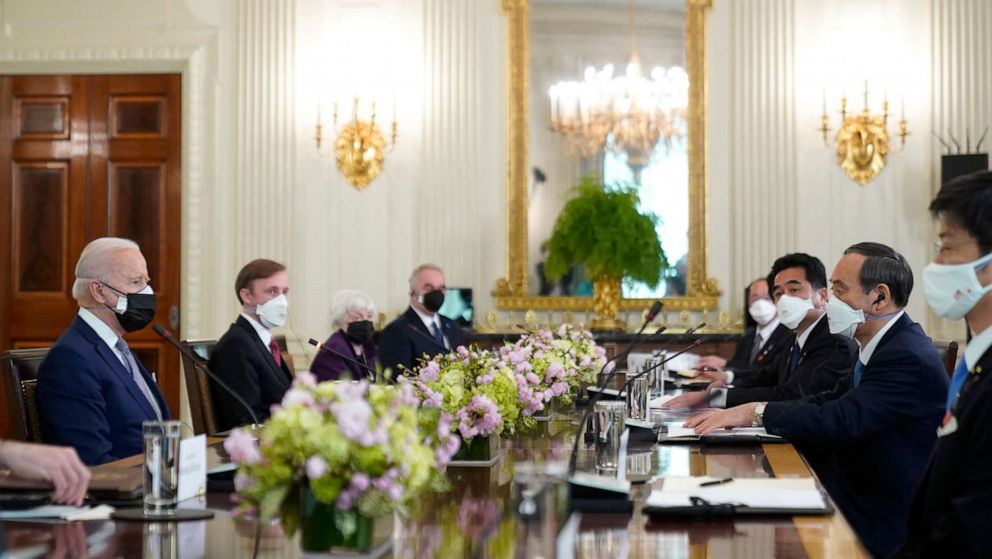
The Biden administration recently completed a review of United States' policy toward North Korea and the White House has said its approach would largely represent a departure from former President Donald Trump's.
"Our policy will not focus on achieving a grand bargain, nor will it rely on strategic patience," White House press secretary Jen Psaki told reporters last month. "Our policy calls for a collaborative, practical approach that is open to and will explore diplomacy with the DPRK, and to make practical progress that increases the security of the United States, our allies, and deployed forces."
Ahead of Friday's meeting between Biden and Moon, a senior official said it would "be spent discussing" North Korea, but U.S.-South Korea economic ties would also take center stage.
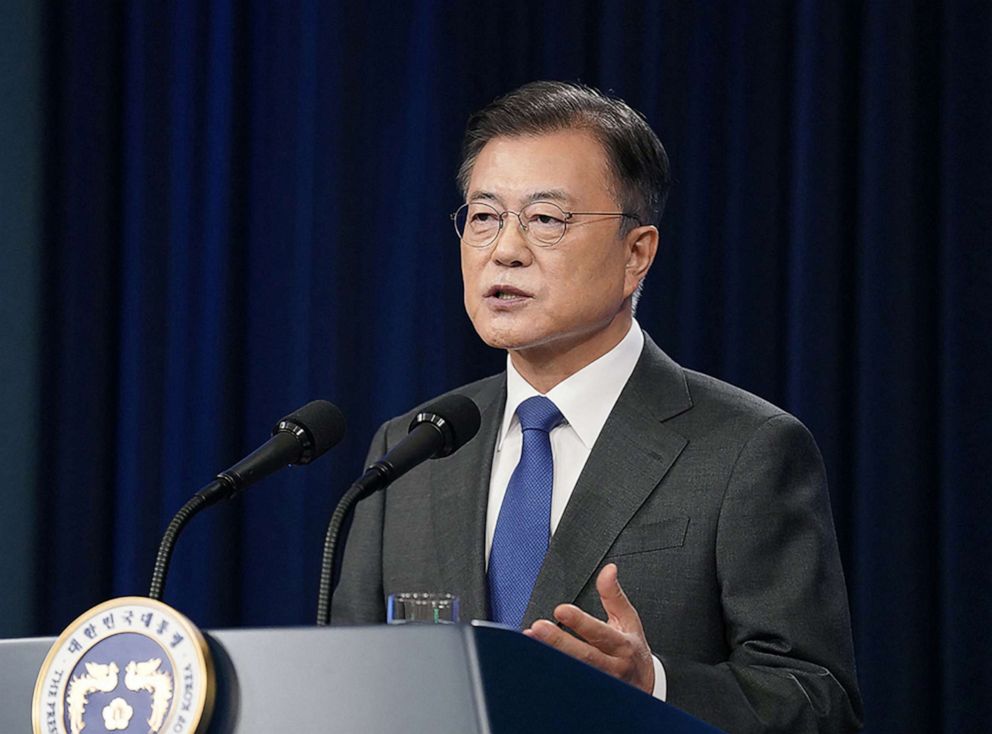
During his joint press conference at the White House with his South Korean counterpart, Biden indicated Friday evening that he would be open to meeting with Kim Jong Un if the North Korean leader made a "commitment" to have a "discussion about his nuclear arsenal" and after some sort of "outline" had already been negotiated by his secretary of state.
That’s a departure from Trump, who saw meetings with Kim as catalysts for bringing about change -- rather than capstones to careful, substantive negotiations.
Biden made clear he would not just meet with Kim for the sake of meeting.
"What I would not do is I would not do what had been done in the recent past," Biden said. "I would not give him all that he's looking for, his national -- international recognition is legitimate, and say, and give him what allowed him to move in a direction of appearing to be more serious about, how can I say it, more serious about what he wasn't at all serious about. I'd have to know specifics."
Meanwhile, Moon announced that Biden had "pledged to supply vaccines to Korean servicemen."
Biden presented it as a way to keep American service members safe.
"There are 550,000 Korean soldiers, sailors, airmen who work in close contact with American forces in Korea," Biden said. "We'll provide full vaccinations for all 550,000 of those Korean forces engaging with American forces on a regular basis, both for their sake as well as the sake of the American forces."
He said the U.S. has spoken with "one of the major vaccine producers in the United States" – he didn’t say one – and with "that particular company" would be able to help South Korea produce vaccine doses itself.
Biden also announced he was appointing Ambassador Sung Kim, "a career diplomat with deep policy expertise," to serve as the U.S. special envoy for North Korea.
Earlier in the afternoon, Biden also awarded the first Medal of Honor of his presidency to a retired colonel for "acts of gallantry and intrepidity" during the Korean War.
Moon attended the White House ceremony for retired Army Col. Ralph Puckett Jr., marking the first time a foreign leader has done so.
"The president was kind enough to come and spend the entire time there and to personally congratulate him," Biden said later. "And I also want to point out that our history of shared sacrifice and our cooperation is vital to maintain peace and stability in a critical region of the world."
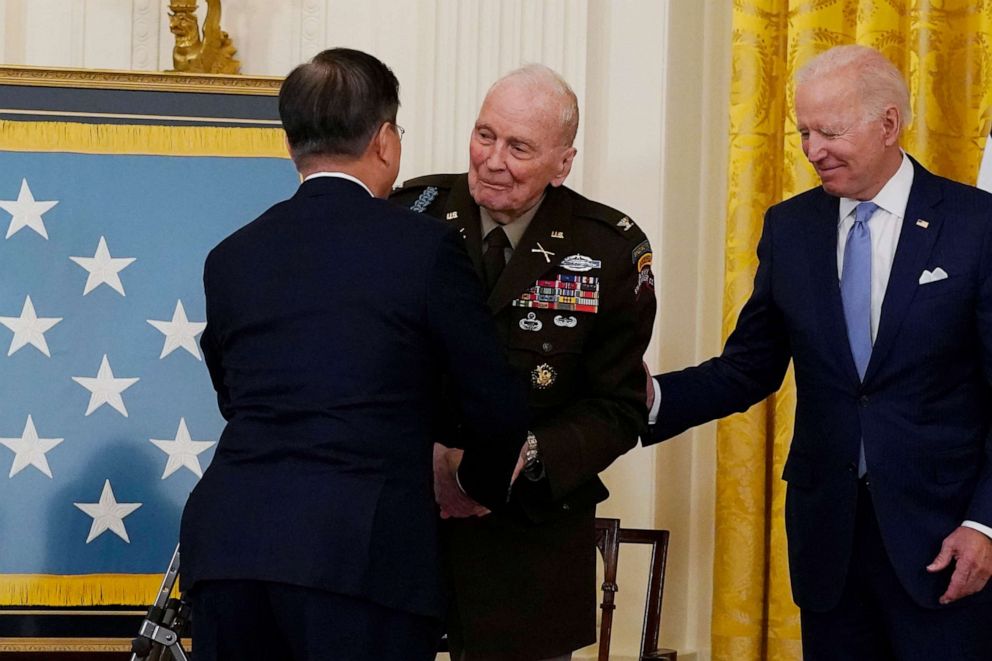
The South Korean president also met with House Speaker Nancy Pelosi on Thursday.
ABC News' Justin Gomez and Libby Cathey contributed to this report.




